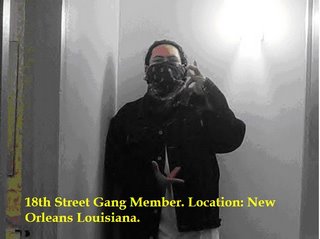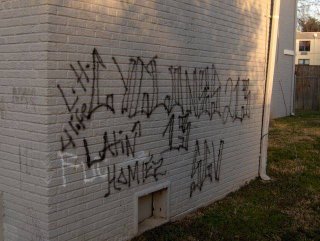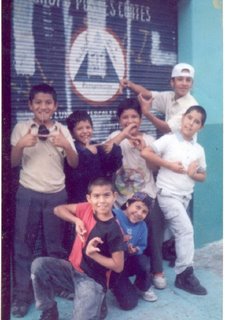The Wannabe Lie

"In a 1995 Tennessee Gang Investigator’s conference the Federal Bureau of Investigation stated that wanna be, false flaggers, or fake gang youth should be considered just as dangerous as real gang members."
N
By Jeffrey Jones
Months after floodwaters that submerged 80 percent of
"Crime today is not as bad as it was before August 29, which is before (Hurricane) Katrina. But I think it's also safe to say that crime has been escalating in this city, particularly since it has begun to repopulate," said Raphael Goyeneche, president of the Metropolitan Crime Commission, a police watchdog group.
"That's what I think the public is concerned about, they're seeing some upticks, some escalation since January, and particularly since Mardi Gras, and they're concerned we may be returning to pre-Katrina."
During Mardi Gras in February, 22-year-old Jermaine Wise was shot and killed. In March, police arrested Ivory "B-Stupid" Harris, 20, in connection with the killing.
On March 19, musician Michael Frey, 28, was walking home in the Faubourg Marigny area near the French Quarter when a robber killed him with a shotgun blast to the chest.
The same day, a gunman opened fire on one of the famous music processions that are part of
POLICE SAY CRIME IS DOW
Despite the brazen acts, police contend crime is down by a wide margin, even accounting for the evacuation. The current population, about 200,000, is less than half the pre-storm number.
"Everybody talks about crime, but the reality is we've got less crime now that we've had in decades. Overall, our crime figures seem to be down around 70 percent,"
There have been 18 homicides this year, down from 68 by April 2005, he said. Part of it is because the department's 1,400 officers have the resources to follow cases and make arrests under Chief Warren Riley, Quentin said.
Quentin said some troublemakers are among those returning to the city, but he characterised them as "gang wannabes." He also dismissed reports that gangs were setting up shop in abandoned homes around town.
Jeweller Janet Bruno-Small said prior to the hurricane, "there was just something in the environment that was very dangerous and very volatile. However, since the storm, I've felt pretty safe. Although recently people have been warning me to be more cautious."
Before Katrina struck, the majority of the crime in
One prescription for keeping crime down after the country's worst natural disaster is demanding professionalism from a police force that had a reputation for corruption and poor relations with the public, he said.
The police department is struggling to rebuild credibility after dozens of its officers abandoned duties or looted stores in the chaos after the storm.
(c) Reuters 2006. All rights reserved. Republication or redistribution of Reuters content, including by caching, framing or similar means, is expressly prohibited without the prior written consent of Reuters. Reuters and the Reuters sphere logo are registered trademarks and trademarks of the Reuters group of companies around the world.
This article: http://news.scotsman.com
Last updated:
In the article above gang activity in the still wounded city of New Orleans is, at least in part, being described as "wannabe" gang activity. But these "wannabes" look like they are doing a good job of acting like REAL gang members.
So the same city that was controlled by gangs right after the storm is now only dealing with "wannabes". "Crime isn't as bad" as it was before the flood they say. But there are less people to do the shooting and to get shot. They say they have less crime than they've had in decades...REALLY???? THEY HAVE LESS PEOPLE THAN THEY'VE HAD IN DECADES!!!! You cannot write comedy this good.
I have decided to put an end to this nonsense rather than go on railing against people trying to cover their political butts.
The following is from one of the trainings I do on gangs. Since the authorities and or media are so quick to "calm fears" with slinging the term "wannabe" around I want to be sure that others have the opportunity to make their own decisions based on fact, not political slant.
Real gang members will even tell you that the most dangerous juvenile is one who is “false flagging”
Why is this?
A juvenile who wants to be in a gang will often go to extremes to prove that he is “down”.
As a result he may be more prone to violence.
He may be much more vocal about gang activity.
He may draw attention to himself by committing acts he believes to be gang related.
He is more likely to be recruited into a real gang
Real gang members generally do not target “civilians” they do not perceive to be a threat. (Or an easy mark) However…
Juveniles who are “false flagging” are considered very offensive. Gang members will “test” others who claim a “set” with a series of questions.
If the “false flagger” cannot answer correctly…
He can be severely beaten or killed.
False flagging is considered a “violation”
Gang members consider false flagging as the ultimate sign of disrespect.




<< Home